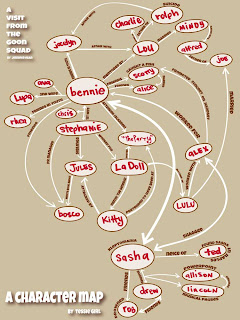Imitation of Life
I didn't want to bury this in the last post, but another thing I've been confronting in my writing the last year or so is the age old battle "Show, Don't Tell" - specifically the war between interior character investigation and revealing character and emotion through action. I prefer, instinctively, the latter; Joyce is a big influence here, as is my love of film. Great cinema never tells, it only shows. In fiction, you can hang yourself doing this.
Maud talks about her own struggles with this on this page (read ALL of these posts, they're worth it) and links to Anne Reid, who writes a great essay on the front line of this battle - the workshop. Where Ben is right now, lucky bastard. I can't wait to hear his war stories.
Maud talks a lot about David Lodge and his book Consciousness and the Novel, which I'm going to buy right now, because of things like this:
'The emphasis on dialogue and external appearances in [Waugh, Isherwood and Hemingway], leaving thought and feeling to be implied, was not the only effect of the cinema on the novel. It also brought story back into literary fiction. The novel of consciousness tended to neglect story, or diminish its importance, for obvious reasons. The deeper you go, as a writer, into the minds of your characters -- the more details and refined our registration of their thoughts, feelings, sensations, memories, scruples -- the slower the narrative tempo becomes, and the less action there is. '
And you know what I think about the war against story.
Maud talks about her own struggles with this on this page (read ALL of these posts, they're worth it) and links to Anne Reid, who writes a great essay on the front line of this battle - the workshop. Where Ben is right now, lucky bastard. I can't wait to hear his war stories.
Maud talks a lot about David Lodge and his book Consciousness and the Novel, which I'm going to buy right now, because of things like this:
'The emphasis on dialogue and external appearances in [Waugh, Isherwood and Hemingway], leaving thought and feeling to be implied, was not the only effect of the cinema on the novel. It also brought story back into literary fiction. The novel of consciousness tended to neglect story, or diminish its importance, for obvious reasons. The deeper you go, as a writer, into the minds of your characters -- the more details and refined our registration of their thoughts, feelings, sensations, memories, scruples -- the slower the narrative tempo becomes, and the less action there is. '
And you know what I think about the war against story.


Comments